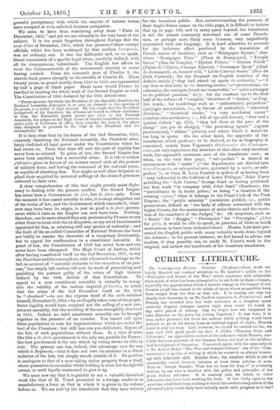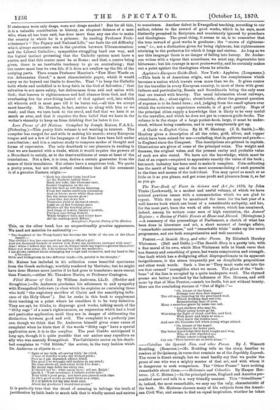CURRENT LITERATURE.
The Contemporary Review. October. (Strahan.)—Last week we briefly directed our readers' attention to Mr. Ludlow's article on the "Principles and Issues of the War," which expresses with admirable force much of what has been attempted to be set forth in these columns, especially the apprehension which a sinister change in the temper of the Gorman people has caused in the minds of many whose sympathies have been ranged from the first on that side. It is coming out only too clearly that Germany is, as Mr. Ludlow expresses it, Prussianized ; and Prussia has crowded into her brief existence as a kingdom more cynically flagrant outrages against right than could be found in any other period of history. Can we forget how she bargained to take Hanover as the price for joining Napoleon ? It was done, it is true, under pressure, but there are nations which nothing would have induced to go so far astray from an habitual regard of right; Prussia found it only too easy. Lest, however, we should be carried too far, we may read with great profit the Rev. J. Gibb's "Prussian State and Literature," an appreciative review of the influence which Prussia, cer- tainly the most practical of the German States, has had on the intellec- tual development of the nation. Connected, again, with the same subject is Mr. Arthur Helps' "The War and General Culture," one of his "Con- versations," a species of writing in which he seems to us always to man- age with admirable skill. Besides these, the number, which is one of remarkably varied interest, contains at least three articles of note. That on Joseph Mazzini : What has he done for Italy ?" is evidently written by one who is familiar with the policy and principles of the great Italian reformer. It is scarcely just, we think, to ether influences that have been working for Italy. It lies fairly open to the question,—had there been nothing to check the revolutionary action of the advanced party would Italy have actually made such progress as it has?
If statesmen were only drags, were not drags needed ? • But for all this, it is a valuable contribution to history, an eloquent defence of a man who, when all has been said, has done more than any one else to make the country in which he is a prisoner. In reading Professor Froh- schammer's "The Papacy and National Life," one feels the old difficulty which always encounters one in the question between Ultramontanism and the Liberal Catholics ; sympathies struggling hard one way, and the logical instinct protesting that the Catholic system must have a centre, and that this centre must be at Rome ; and that, a centre being given, there is an inevitable tendency to go on centralizing ; that the centre must lose its own life, if it does not swallow up the life of the outlying parts. Then comes Professor Maurice's "Few More Words on the Athanasian Creed," a most characteristic paper, which it would carry us far beyond our limits to describe. That "to keep the Catholic faith whole and undefiled is to keep faith in the God of Salvation ;" that salvation is not mere safety, but deliverance from evil and union with God ; that heaven is righteousness and hell absence from God, and the everlasting fire the ever-living hatred of God against evil, into which all wherein evil is must pass till it be burnt out,—all this we accept most heartily. Mr. Maurice, in fact, carries us along with him as we read; and then we turn back to the creed, and find that we hate it as much as ever, and that it requires the firm belief that we have in the writer's sincerity to keep us from thinking that he hates it too.































 Previous page
Previous page